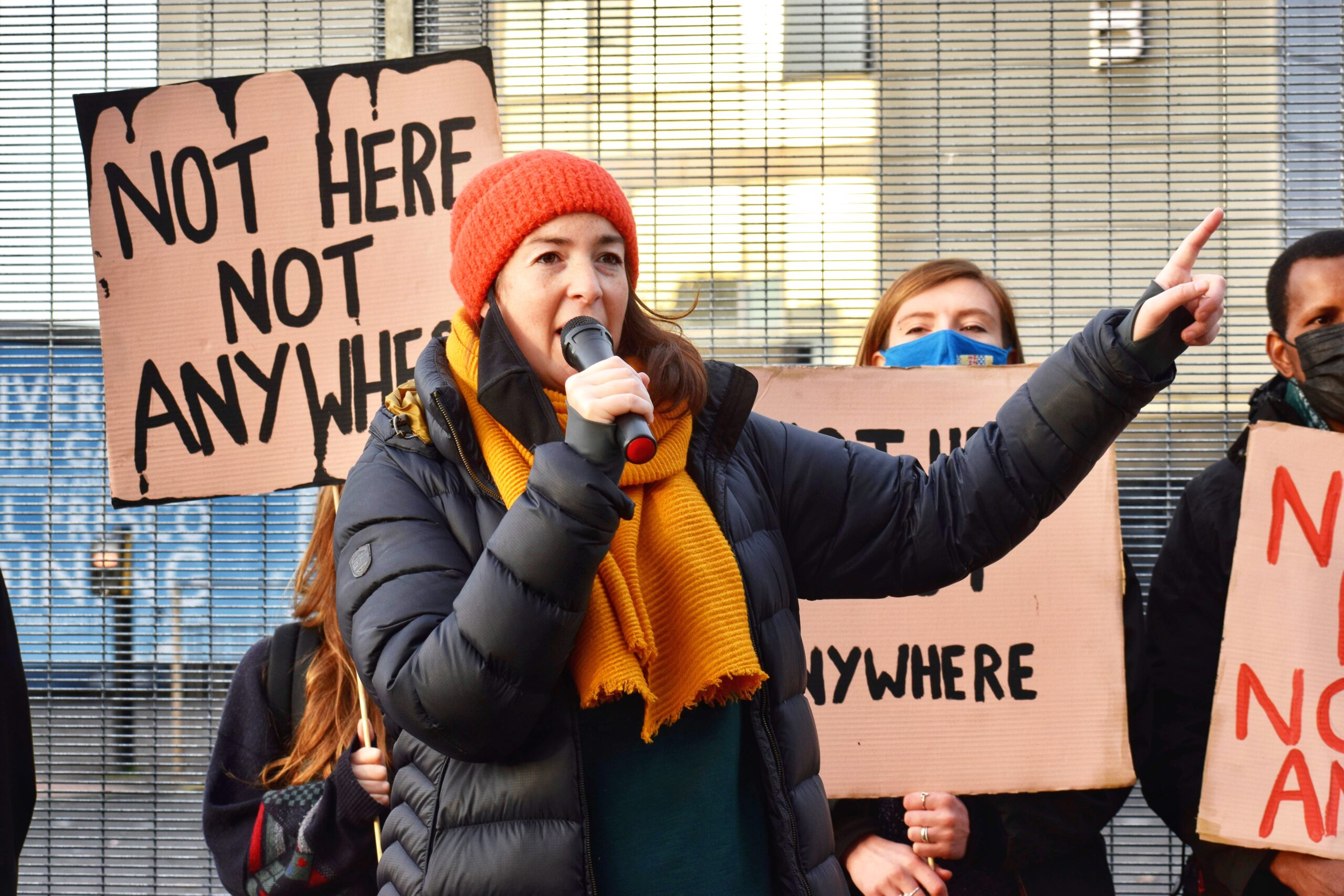
SNP Confirm Planning Buffer Zones for Dirty Gas
Friends of the Earth Scotland has warmly welcomed the Scottish Government’s strengthened commitment today to introduce buffer zones between unconventional gas developments and communities.
Paul Wheelhouse, Minister for Environment and Climate Change spoke to a crowd of concerned citizens and environment groups outside the SNP party conference today in Perth and handed Friends of the Earth Scotland a letter from Planning Minister Derek Mackay. The letter says that Ministers have listened to the large amount of feedback on their draft planning proposals and are minded to introduce buffer zones around unconventional gas developments.
Mary Church, Friends of the Earth Scotland Head of Campaigns, said, “While this isn’t yet the ban we need, it is a firm step in the right direction and a huge problem for Dart Energy’s current plans for drilling for gas in Scotland.
Dart should see which way the wind is blowing and give up now.
“We welcome the Government’s recognition that buffer zones are necessary to protect communities from the worst impacts of gas drilling and fracking, and urge them to go further and join France, Ireland and many others by putting a stop to all fracking and unconventional gas activity. If Scotland is to play its part in reducing global greenhouse gas emissions, we need to leave this fossil fuel in the ground.”
An extract from Derek Mackay’s letter, addressed to Dr Richard Dixon, Director of Friends of the Earth Scotland, said,
“I note in particular Friends of the Earth Scotland’s comments warmly welcoming the change to planning policy on unconventional gas from that set out in the current SPP; and I can confirm that I am minded that the change will go forward into the final version of Scottish Planning Policy, which will be published next year.”
The move is in line with policy in New South Wales, which brought in buffer zones of 2km near residential areas in February this year after strong community opposition.
Friends of the Earth Scotland are calling for a ban on all unconventional gas extraction because of the climate and local environmental and health risks associated with the industry. However, buffer zones would go some way to helping to protect the communities most vulnerable to the harmful impacts of fracking and coal bed methane.
The commitment from Mr Mackay comes on Global Frackdown Day, an international opportunity for people to call on governments to stop dirty gas exploration.
A public inquiry is due to consider an application for commercial coalbed methane extraction at Airth, near Falkirk, next year, following over 2,500 objections. The project, by Australian company Dart Energy, is the most advanced unconventional gas project in the UK. If it goes ahead, it could open the door on thousands of gas wells across the central belt of Scotland.
ENDS
Notes to Editors
1. Global Frackdown Day is supported by over 200 organisations around the world. Find out more at http://foe-scotland.us2.list-manage2.com/track/click?u=b5ad0d61b2a67d22c… FoE Scotland’s briefing on unconventional gas is here: http://foe-scotland.us2.list-manage.com/track/click?u=b5ad0d61b2a67d22c6…
2. Concerned citizens from Falkirk, Stirling and Dumfriesshire and environment groups were gathered outside the SNP conference today. Protestors built a mock drilling rig and ‘Daft Energy’ workers operated it. (Pictures available shortly).
3. Australian company Dart Energy is the leading unconventional gas developer in Scotland. Dart’s flagship development at Airth, near Falkirk faces strong community opposition and has been beset by delays, and attracted 2,500 objections. In June 2013 Dart appealed their application for 22 new wells, a gas and water treatment facility and a network of pipelines to the Scottish Government on grounds of non-determination. A Public Inquiry is expected to start in early 2014. Dart also plan to drill for coalbed methane at Canonbie, where the company has planning permission for wells at 19 sites; it also has a further two licenses to explore large areas in Fife. Another company – Reach Coal Seam Gas – is hoping to develop coalbed methane in North Lanarkshire, where it has a license to explore a large area. However, the company recently withdrew a planning application for a development at Moodiesburn, following significant public opposition.
4. In 2014 the UK Department for Energy and Climate Change (DECC) will launch the tendering process for its 14th round of onshore licensing during which a vast swathe of the central belt of Scotland could be put out to tender for oil and gas exploration. British Geological Survey announced this week that they were launching a new search for shale gas in the central belt.
5. Bans and moratoria around the world
France: A nationwide ban on fracking
Switzerland: A moratorium on fracking was introduced in the canton of Fribourg
Germany: Moratorium in Northrhine-Westphalia on fracking. Lower Saxony likely to do the same.
Bulgaria: Government banned fracking
Czech Republic: A moratorium on fracking, considering outright ban
Spain: Cantabria banned fracking, La Rioja is also currently considering same
Netherlands: Moratorium on unconventional fossil fuels
Denmark: Moratorium on fracking
Quebec: A moratorium on fracking
United States: Vermont banned fracking, and New York has moratorium
New South Wales: ban on any coal bed methane activity within 2km of residential
areas, and within critical industry clusters such as winegrowing areas
Ireland: 2-year moratorium on fracking
6. Friends of the Earth Scotland is:
* Scotland’s leading environmental campaigning organisation
* An independent Scottish charity with a network of thousands of supporters and
active local groups across Scotland
* Part of the largest grassroots environmental network in the world, uniting over 2
million supporters, 77 national member groups, and some 5,000 local activist groups.
www.foe-scotland.org.uk
